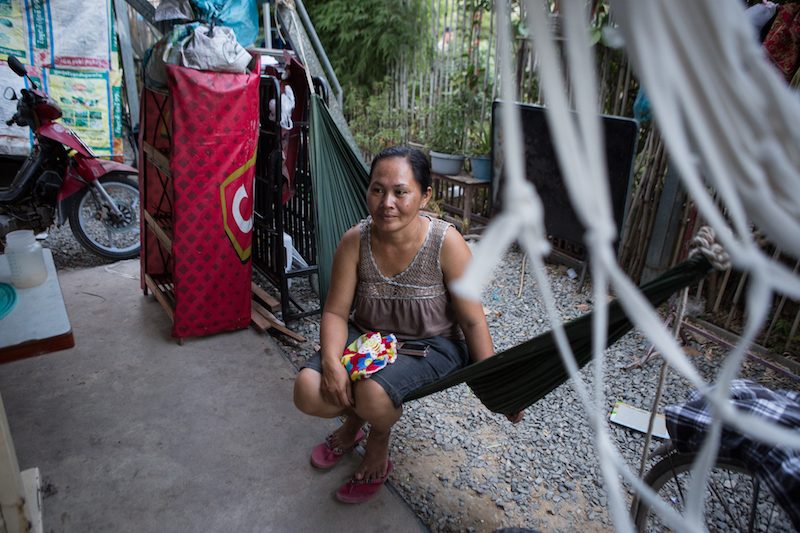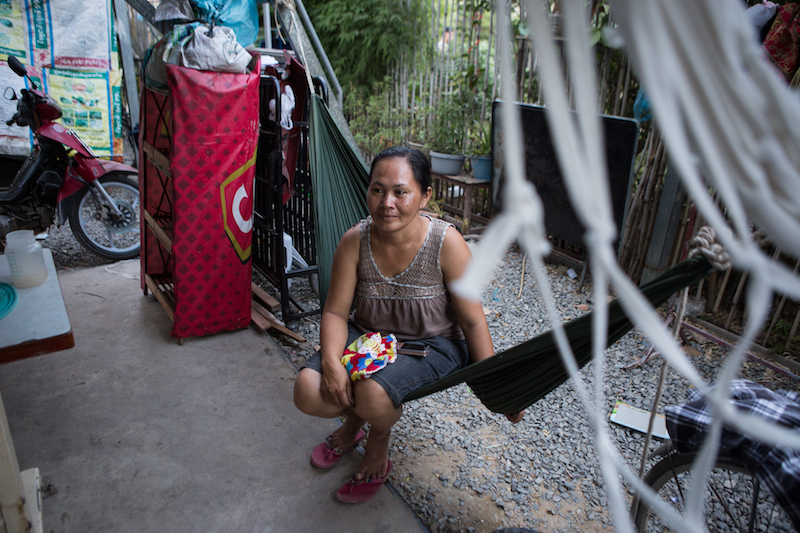Nine months ago, 40-year-old Yorn Thina was approached at her NGO-built home in a slum on the outskirts of Phnom Penh with a rare opportunity.
She was offered a relatively high-paying job with minimal hours, and the flexibility to bring her 1-year-old baby to work. All she would be required to do was sit—as her excess breast milk was pumped.

The offer came from U.S.-based company Ambrosia Milk—known locally as Khun Meada, which means “gratitude of mothers” in Khmer—which had been recruiting Cambodian mothers and selling their breast milk to customers in the U.S. since it set up shop in Stung Meanchey district in 2015.
However, a government-ordered halt on breast milk exports means she has been out of work for almost two weeks, along with what she estimates are about 90 other women—she was the 40th to sign up for the job.
Sok Saravuth, an undersecretary of state at the Finance Ministry, which oversees customs, said on Tuesday that as the industry was about to expand, the government needed to examine ethical concerns.
“It is not a ban. It has just been temporarily shut down because the Health Ministry wants to examine…concerns that the [Cambodian] babies would not get well-fed,” Mr. Saravuth said. “The concern is that the parent might use rice porridge broth instead” of breast milk, he added.
Mr. Saravuth said that although breast milk had been exported “only a few times,” exports appeared set to increase, and the practice would therefore need to be studied. A similar temporary ban was placed on surrogate pregnancies late last year as the government drafts a law regulating a practice that was quickly expanding in the country.
Ms. Thina, who had been making a meagre wage on irregular seamstress work, said she could make up to $20 in one day if she produced three 10-ounce bottles of milk, which would earn her about $120 after a six-day working week. The minimum wage for garment factory workers, by contrast, is $153 per month.
Ambrosia, in turn, sells the milk online for $200 for a 10-pack of five-ounce packets of powdered breast milk formula.
An accountant for Ambrosia said that the company had exported about 500 kg of frozen breast milk every two to three months since it began operations, but that the latest 500 kg cargo had been waiting for shipment after the government’s intervention.
“The company closed on March 11 because the Health Ministry would not issue a permit to export,” Ngoun Srey Touch said on Tuesday.
Though Mr. Saravuth and other officials quoted in local media cited health and ethical concerns, Ms. Thina said she had been told the company had to close because the Interior Ministry was charging exorbitant amounts for export taxes.
“My boss told me the Interior Ministry charged too much, and [the company] was losing a lot of money,” she said.
It was only when the company, founded by Bronzson Woods, who came up with the idea as a mormon missionary in Cambodia, had stopped making the payments that exports were banned, she said.
Whatever the reason, the shutdown has hit Ms. Thina hard.
For now, she said, she is relying on a small amount of savings and rice donated from a nearby NGO-run school that two of her four children attend. Her husband has been out of work for a while with an illness, she added.
“I have a young baby, so I can’t find other work,” she said, adding that since she swapped sewing for more lucrative prospects last year, she had struggled to find customers again. Her baby, which she breastfed on a hammock as she spoke to reporters, is now 18 months old.
“There’s no one to look after her,” she said.
According to Ms. Thina and Ambrosia’s website, mothers are required to exclusively breastfeed their own child for at least six months before providing milk to the company.
However, Unicef spokeswoman Iman Morooka said the commercialization of human breast milk exploited poor women and should be banned, as it undermined recommendations to appropriately breastfeed children until the age of 2 years old, at least five times per day.
“Unicef believes that breastmilk banks should never be operated by exploiting vulnerable and poor women for profit and commercial purposes,” Ms. Morooka said in an email.
She noted that child malnutrition remains a problem in Cambodia, and that “proper breastfeeding is one of the key factors contributing to a child’s good health and nutrition.”
Neither Mr. Woods, Ambrosia’s founder and CEO, nor his business partner, Ryan Newell, could be reached for comment on Tuesday.
In an article published on the website Broadly this month, however, Mr. Woods described his business in Cambodia as a “win-win” for both the company and the women producing the milk it was selling on the other side of the world.
“To come to Cambodia…it’s not about paying women less,” he said. “It’s about attracting more supply at a similar price.”
Correction: A previous version of this article incorrectly stated the monthly minimum wage for garment factory workers as $144. As of January, it was increased to $153.




